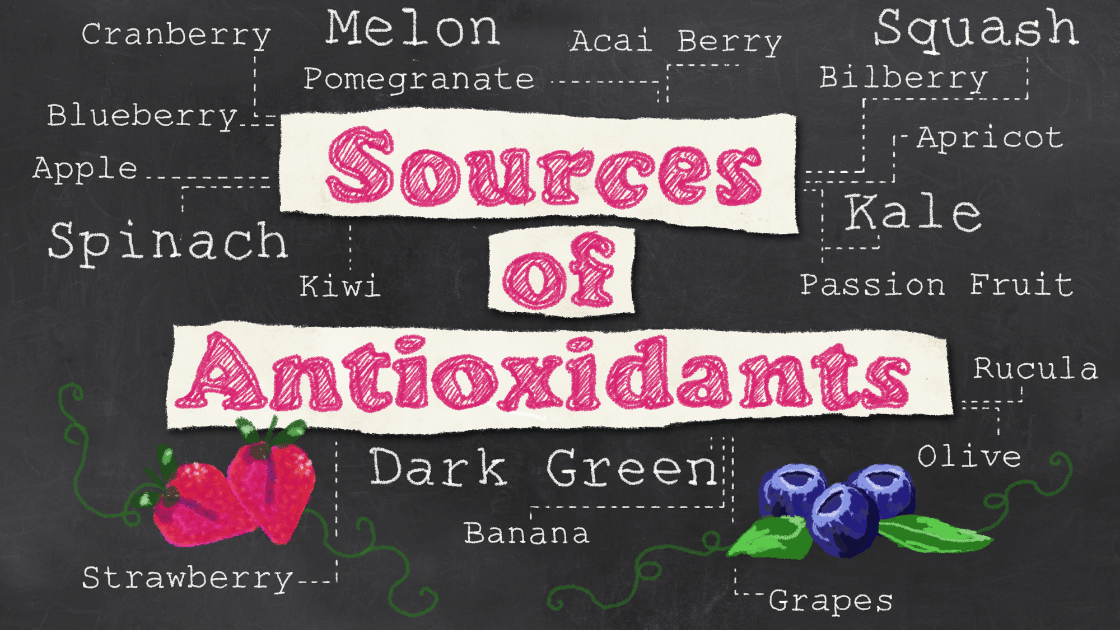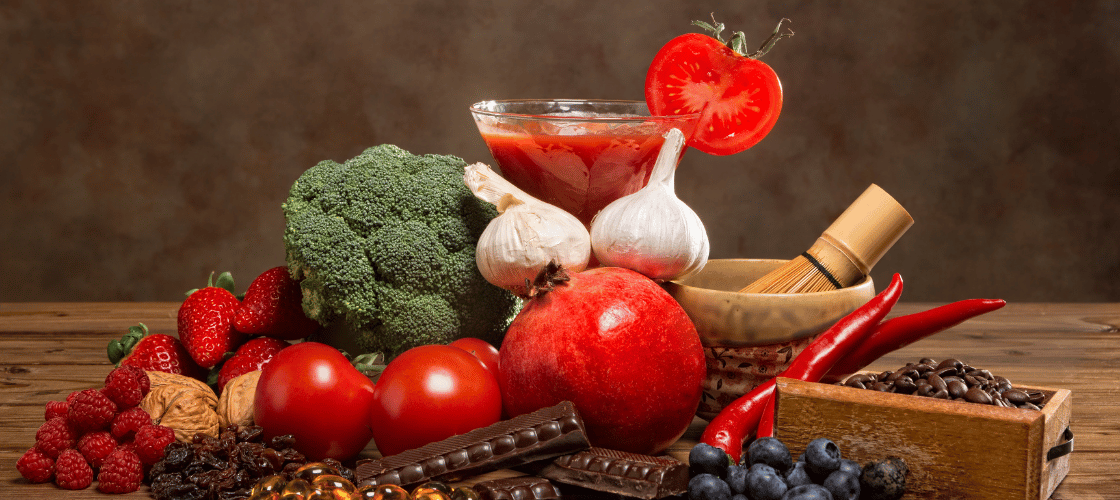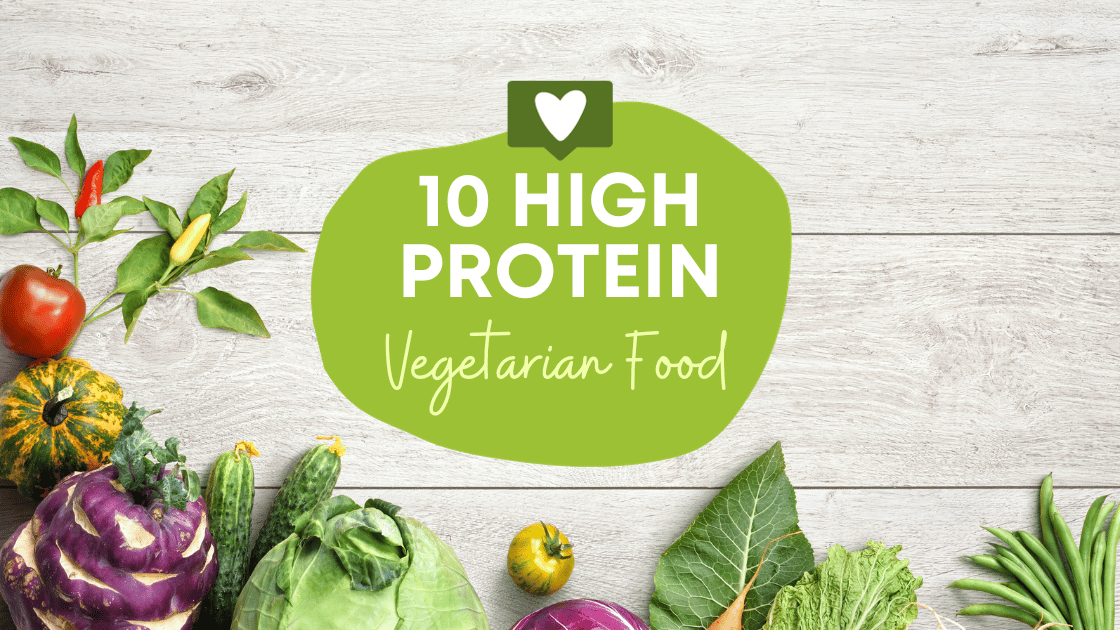Antioxidants: Health Benefits, Sources, and Supplements

Antioxidants are essential for our body’s defense system as they fight against oxidative stress. These natural molecules are abundantly present in plant-based foods and have gained a lot of attention due to their potential health advantages. In this article, we will explore antioxidants in detail, including their health benefits, sources, types, and the need for supplements. By the end of this article, you will have a comprehensive understanding of antioxidants and how they can contribute to your overall well-being. We will provide practical tips on how to incorporate more antioxidants into your diet and make the most of their benefits. So let’s begin our journey into the world of antioxidants and discover how they can improve your health!
The food you eat can either be the safest and most powerful form of medicine or the slowest form of poison. – Ann Wigmor
Understanding Antioxidants: Nature’s Disease Fighters
Antioxidants are natural molecules found in plant foods that help neutralize harmful free radicals in the body. Free radicals are unstable molecules produced by the body and external factors, which can increase inflammation and health risks. Antioxidants protect against oxidative stress and are linked to reducing the risk of chronic diseases such as heart disease, cancer, arthritis, stroke, and vision loss.
Comprehensive Definition
Antioxidants are compounds that inhibit oxidation, a chemical reaction that can produce free radicals, leading to chain reactions that may damage cells. They work to combat oxidative stress by neutralizing free radicals before they can cause harm.
Role in Neutralizing Free Radicals
The primary role of antioxidants is to neutralize harmful free radicals, preventing them from causing damage to cells and tissues in the body. This process helps reduce the risk of chronic diseases and supports overall health and well-being.
Importance of Plant-Based Foods
Emphasize that a diet rich in plant-based foods is the best way to obtain a wide range of antioxidants. Fruits, vegetables, nuts, seeds, whole grains, and legumes are excellent sources of diverse antioxidants that work synergistically to support various bodily functions. By incorporating these antioxidant-rich foods into your diet, you can harness the power of nature’s disease fighters to promote optimal health and reduce the risk of age-related conditions.
The Powerful Health Benefits of Antioxidants
Free radicals are unstable molecules that can cause damage to our cells and DNA. When these free radicals accumulate in the body, they can lead to chronic inflammation, which is associated with a range of health risks including heart disease, cancer, arthritis, stroke, and vision loss. Antioxidants play a crucial role in neutralizing these harmful free radicals and reducing the risk of chronic diseases. Scientific evidence has shown the numerous health benefits of antioxidants:
1. Reduced Risk of Heart Disease
Antioxidants have been found to protect against heart disease by preventing the oxidation of LDL cholesterol, which is a key factor in the development of atherosclerosis.
2. Cancer Prevention
Antioxidants help protect against cancer by neutralizing free radicals that can damage DNA and lead to the formation of cancer cells. Studies have shown that diets high in antioxidants are associated with a lower risk of certain types of cancer.
3. Arthritis Relief
Oxidative stress and inflammation play a role in the development and progression of arthritis. Antioxidants can help reduce inflammation and provide relief from joint pain and stiffness.
4. Stroke Prevention
Free radicals contribute to the development of stroke by damaging blood vessels and promoting blood clot formation. Antioxidants help protect against stroke by reducing oxidative stress and improving blood vessel function.
5. Vision Protection
Antioxidants such as vitamin C, vitamin E, and lutein are essential for maintaining eye health and protecting against age-related macular degeneration and cataracts. In addition to these specific benefits, antioxidants also have anti-aging effects on overall health and well-being. They help combat oxidative stress, which is one of the underlying factors contributing to aging. By neutralizing free radicals, antioxidants can help slow down the aging process and promote healthy aging. By incorporating antioxidant-rich foods into your diet, you can harness the powerful health benefits of antioxidants and reduce the risk of chronic diseases.
Top Food Sources of Antioxidants
Antioxidants are abundant in a variety of plant-based foods, making it easy to incorporate them into your daily diet. Here are some top food sources of antioxidants:
- Nuts: Almonds, walnuts, and hazelnuts are rich in antioxidants such as vitamin E, which helps protect cells from oxidative damage.
- Seeds: Flaxseeds, chia seeds, and sunflower seeds are excellent sources of antioxidants, including lignans and vitamin E.
- Oils: Extra virgin olive oil and coconut oil contain powerful antioxidants that contribute to their health benefits.
- Colorful Fruits and Vegetables: Berries (blueberries, strawberries, raspberries), kale, spinach, bell peppers, and tomatoes are packed with various antioxidants like vitamin C, beta-carotene, and flavonoids.
Incorporating these antioxidant-rich foods into your meals can provide a wide range of health benefits while adding delicious flavors and textures to your diet. 
Maximizing Antioxidant Intake: Food Preparation Tips
When it comes to getting the most antioxidants from the food we eat, how we prepare and cook our meals can make a big difference. Here are some tips to help you make sure you’re getting the most out of the antioxidant-rich foods you eat:
1. Choose gentle cooking methods
Instead of using high-heat techniques like frying or grilling, try cooking your food with lower temperatures and shorter cooking times. This can help minimize the loss of nutrients, including antioxidants. Some cooking methods to consider are:
- Steaming: This involves cooking food over boiling water in a covered pot or steamer basket.
- Sautéing: This method uses a small amount of oil or butter to cook food quickly over medium heat.
- Stir-frying: Similar to sautéing, but with higher heat and constant stirring.
2. Preserve water-soluble antioxidants
Certain antioxidants, like vitamin C and some B vitamins, are sensitive to heat and can be lost during cooking. To keep these antioxidants intact, try these tips:
- Cook vegetables with minimal water: Instead of boiling vegetables in a large amount of water, steam them or use just enough water to cover them.
- Preserve cooking liquid: If you do boil vegetables, save the nutrient-rich cooking liquid for soups or sauces.
3. Retain fat-soluble antioxidants
Other antioxidants, such as vitamin E and carotenoids, are better preserved when cooked with a small amount of healthy fats. Here’s what you can do:
- Add a drizzle of olive oil: When sautéing vegetables or roasting them in the oven, toss them with a small amount of extra virgin olive oil.
- Pair fruits and veggies with healthy fats: Enjoy antioxidant-rich fruits and vegetables with foods like nuts, seeds, avocado, or hummus to enhance nutrient absorption.
4. Minimize exposure to air and light
Oxygen and light can break down antioxidants over time, so it’s important to protect them from these elements. Here are some ways to do that:
- Store cut fruits and vegetables properly: Place them in airtight containers or wrap them tightly in plastic wrap to limit exposure to air.
- Keep produce away from direct sunlight: Store fruits and vegetables in a cool, dark place or in the refrigerator to slow down the breakdown of antioxidants.
By following these food preparation tips, you can help ensure that you retain as many antioxidants as possible in your meals. Remember that incorporating a variety of antioxidant-rich foods into your diet is key to reaping the full benefits of these powerful compounds.
Diversifying Your Antioxidant Defense Team: Exploring Different Types of Antioxidants
When it comes to antioxidants, there are various types that play a crucial role in protecting our cells from damage caused by free radicals. Let’s explore some common types of antioxidants and understand why it’s important to consume a variety of antioxidant-rich foods to obtain these different compounds.
1. Vitamin C
This powerful antioxidant is well-known for its immune-boosting properties. It helps protect against oxidative stress and supports the production of collagen, which promotes healthy skin and connective tissues. Citrus fruits, berries, kiwi, peppers, and leafy greens are excellent sources of vitamin C.
2. Vitamin E
Vitamin E is an essential fat-soluble antioxidant that protects cell membranes from oxidative damage. It works synergistically with vitamin C to neutralize harmful free radicals. Nuts and seeds, such as almonds, sunflower seeds, and hazelnuts, along with avocados and spinach, are rich sources of vitamin E.
3. Beta-carotene
This antioxidant is a precursor to vitamin A and plays a vital role in maintaining healthy vision, supporting immune function, and promoting skin health. Beta-carotene is found in orange-colored fruits and vegetables like carrots, sweet potatoes, mangoes, cantaloupes, and pumpkins.
4. Selenium
Selenium is a trace mineral that acts as an antioxidant in the body. It helps regulate thyroid function and supports a healthy immune system. Brazil nuts are one of the best sources of selenium. Other food sources include seafood, poultry, eggs, and whole grains.
5. Manganese
Although less well-known than other antioxidants, manganese is essential for several enzymatic reactions in the body that help protect against oxidative stress. It is found in nuts, legumes, whole grains, tea, and leafy green vegetables. By diversifying your antioxidant intake and incorporating a wide range of antioxidant-rich foods into your diet, you can ensure that you are obtaining different types of antioxidants, each with its unique benefits. Remember, the key is to consume a variety of colorful fruits and vegetables, along with nuts, seeds, whole grains, and other plant-based foods to maximize your antioxidant defense team.
Food First vs. Supplements: Which is the Better Antioxidant Strategy?
High-dose antioxidant supplements can be a controversial topic when it comes to their role in disease prevention and treatment outcomes. Here’s why it’s important to consider the balance between food sources and supplements:
1. Nutrient Synergy
Whole foods containing antioxidants often provide a combination of vitamins, minerals, fiber, and other beneficial compounds that work together synergistically. This complex interaction may not be replicated by high-dose supplements, potentially reducing their overall effectiveness in promoting health.
2. Bioavailability
The body may absorb nutrients from whole foods more efficiently than those from synthetic supplements. Additionally, some antioxidants require specific enzymes or co-factors present in whole foods to be fully absorbed and utilized by the body.
3. Phytonutrients
Whole food sources of antioxidants also contain phytonutrients, which are natural chemicals that contribute to the vibrant colors, flavors, and aromas of plant-based foods. These compounds have been linked to various health benefits, including antioxidant effects that may not be captured in supplement form. In contrast, relying solely on high-dose antioxidant supplements may not provide the same array of health benefits as obtaining antioxidants from a diverse range of whole food sources. It’s essential to emphasize the importance of a balanced diet rich in naturally occurring antioxidants from fruits, vegetables, nuts, seeds, and whole grains for optimal health and well-being.
Potential Risks: When Antioxidants Turn Harmful
Antioxidants are generally considered beneficial for health, but it’s important to understand that there can be potential risks associated with antioxidant supplementation, especially in certain situations. Here, we explore the potential risks of antioxidant supplementation in relation to medication interactions and certain health conditions.
Interference with Medicines
Medication Interactions
Certain antioxidants, such as vitamin E and vitamin C, can interact with medications, affecting their effectiveness or causing adverse effects. For example:
- Vitamin E supplements may increase the risk of bleeding when taken with blood-thinning medications like warfarin.
- High doses of vitamin C may interfere with the absorption and efficacy of certain medications like chemotherapy drugs and oral contraceptives.
Oxidation of Medications
Some antioxidants have the ability to oxidize medications, rendering them less effective or even harmful. This is particularly relevant for medications that are sensitive to oxidation, such as nitroglycerin used for angina.
Increased Disease Risk
Cancer Risk
Contrary to the protective effects of dietary antioxidants, high-dose antioxidant supplements may increase the risk of certain cancers. For instance:
- Beta-carotene supplements have been found to increase the risk of lung cancer in smokers.
- High-dose vitamin E supplements may elevate the risk of prostate cancer.
Cardiovascular Risk
In certain cases, excessive antioxidant intake from supplements may have detrimental effects on cardiovascular health. For example:
- Vitamin E supplements in high doses have been associated with an increased risk of heart failure.
- Antioxidant cocktail supplements have shown no benefit and even an increased risk of cardiovascular events in some studies.
It’s important to note that these potential risks are primarily associated with high-dose antioxidant supplementation rather than obtaining antioxidants from whole food sources. A well-balanced diet rich in naturally occurring antioxidants is generally considered safe and beneficial for most individuals.
Putting It All Together: The Anti-Disease Powerhouse Diet
A balanced and varied diet rich in antioxidants can significantly reduce the risk of developing heart disease, cancers, and other age-related conditions. By incorporating antioxidant-rich foods into your daily meals, you can provide your body with the necessary nutrients to combat oxidative stress and promote overall health.
Here are some key points to consider:
- Include a variety of fruits and vegetables: Colorful fruits and vegetables are excellent sources of antioxidants. Aim to incorporate a wide range of colors in your diet, such as berries, leafy greens, tomatoes, carrots, and bell peppers. These vibrant foods contain different types of antioxidants that work synergistically to protect your body against free radicals.
- Add nuts and seeds: Nuts and seeds, such as almonds, walnuts, chia seeds, and flaxseeds, are packed with antioxidants. They also provide healthy fats and fiber, making them a great addition to your anti-disease powerhouse diet.
- Choose whole grains: Whole grains like brown rice, quinoa, oats, and whole wheat bread not only offer fiber but also contain antioxidants. These grains have higher antioxidant levels compared to their refined counterparts.
- Incorporate healthy fats: Healthy fats found in avocados, olive oil, and fatty fish like salmon contain antioxidants that support heart health. These fats also help enhance the absorption of fat-soluble vitamins like vitamin E.
- Spice it up: Certain spices like turmeric, cinnamon, ginger, and cloves are rich in antioxidants. Adding these spices to your dishes not only enhances flavor but also provides additional health benefits.
By following these dietary tips and incorporating antioxidant-rich foods into your meals, you can create a powerful defense against diseases like heart disease and certain cancers. Remember that a well-balanced diet is always the best approach to obtain antioxidants rather than relying solely on supplements.

Lifestyle Factors That Support Antioxidant Activity
Regular exercise and adequate sleep are two important lifestyle factors that can enhance the effectiveness of antioxidants in the body’s defense against oxidative damage. Here’s how they contribute to optimizing antioxidant activity:
1. Physical activity:
- Engaging in regular exercise stimulates the production of endogenous antioxidants, such as superoxide dismutase (SOD) and glutathione peroxidase, which help combat free radicals.
- Exercise increases blood circulation, delivering oxygen and nutrients to tissues and organs, which supports the antioxidant defense system.
- Aerobic exercise, resistance training, and high-intensity interval training (HIIT) have all been shown to increase antioxidant enzyme activity and reduce oxidative stress.
- Aim for at least 150 minutes of moderate-intensity aerobic exercise or 75 minutes of vigorous-intensity exercise per week, along with strength training exercises twice a week.
2. Quality sleep:
- During sleep, the body repairs and regenerates cells, including those involved in antioxidant defense.
- Lack of sleep can disrupt the body’s natural antioxidant system and increase oxidative stress.
- Adequate sleep duration varies by age, but most adults need 7-9 hours of quality sleep each night.
- Establish a consistent sleep schedule, create a relaxing bedtime routine, and ensure a comfortable sleeping environment to promote optimal sleep quality.
By incorporating regular physical activity and prioritizing quality sleep into your lifestyle, you can enhance the effectiveness of antioxidants in protecting against oxidative damage. Remember that these lifestyle factors work synergistically with a balanced diet rich in antioxidant-rich foods to optimize overall health and well-being.
Avoiding Common Mistakes in Antioxidant Nutrition
It’s important to be aware of the potential pitfalls when it comes to antioxidant nutrition. While antioxidants play a crucial role in maintaining our health, relying solely on supplements or consuming a diet high in processed/junk foods with added antioxidants can hinder their effectiveness. Here are some key points to keep in mind:
1. Beware of Antioxidant Supplements
While antioxidants supplements may seem like a convenient way to boost your antioxidant intake, they may not provide the same health benefits as natural food sources. Research has shown mixed results when it comes to the effectiveness of high-dose antioxidant supplements in preventing chronic diseases. It’s always best to obtain antioxidants from whole foods.
2. Avoid Processed and Junk Foods
Many processed and junk foods claim to have added antioxidants, but it’s important to be cautious. These foods are often high in unhealthy fats, sugars, and additives, which can counteract the potential benefits of antioxidants. Instead, focus on consuming a diet rich in whole plant-based foods that naturally contain antioxidants.
3. Variety is Key
Don’t rely on just one type of antioxidant or one specific food source. Different types of antioxidants have unique properties and roles in the body, so it’s important to consume a variety of antioxidant-rich foods. Aim for a colorful plate filled with fruits, vegetables, nuts, seeds, whole grains, and healthy oils.
4. Balance and Moderation
While antioxidants are beneficial for our health, it’s important to remember that they are just one piece of the puzzle. A balanced diet that includes other essential nutrients is key for overall well-being. Incorporate antioxidants into your diet along with other healthy lifestyle choices such as regular exercise and adequate sleep. By avoiding these common mistakes and adopting a balanced approach to antioxidant nutrition, you can maximize the benefits of antioxidants and support your overall health and well-being.
Remember, the goal is to obtain antioxidants from whole foods rather than relying on supplements or processed foods. A varied and balanced diet is the best way to ensure you’re getting a wide range of antioxidants and other essential nutrients. So, opt for colorful fruits and vegetables, nuts and seeds, and whole grains to fuel your body with the power of antioxidants.
Delicious Recipes Packed with Antioxidant Goodness
Here are a couple of easy-to-make recipes that are not only delicious but also packed with antioxidant goodness:
Recipe: Berry Spinach Salad with Citrus Dressing
Ingredients:
- 4 cups fresh spinach leaves
- 1 cup mixed berries (such as strawberries, blueberries, and raspberries)
- 1/4 cup sliced almonds
- 2 tablespoons crumbled feta cheese
Citrus Dressing:
- Juice of 1 orange
- Juice of 1 lemon
- 2 tablespoons extra-virgin olive oil
- 1 teaspoon honey (optional)
- Salt and pepper to taste
Instructions:
- In a large bowl, combine the spinach leaves, mixed berries, sliced almonds, and crumbled feta cheese.
- In a separate small bowl, whisk together the orange juice, lemon juice, olive oil, honey (if using), salt, and pepper until well combined.
- Pour the citrus dressing over the salad mixture and toss gently to coat.
- Serve immediately and enjoy!
This vibrant salad is bursting with antioxidants from the berries and spinach. The citrus dressing adds a refreshing tang while providing even more antioxidants from the orange and lemon juices.
Recipe: Roasted Turmeric Cauliflower Steaks
Ingredients:
- 1 large head of cauliflower
- 2 tablespoons olive oil
- 1 teaspoon turmeric powder
- 1/2 teaspoon garlic powder
- Salt and pepper to taste
Instructions:
- Preheat your oven to 425°F (220°C) and line a baking sheet with parchment paper.
- Remove the leaves from the cauliflower head and trim the stem so that it sits flat on the cutting board.
- Slice the cauliflower into thick “steaks” by cutting vertically from top to bottom.
- In a small bowl, mix together the olive oil, turmeric powder, garlic powder, salt, and pepper.
- Brush the turmeric mixture onto both sides of each cauliflower steak.
- Place the cauliflower steaks on the prepared baking sheet and roast in the oven for 25-30 minutes, or until golden brown and tender.
- Remove from the oven and let cool slightly before serving.
These roasted turmeric cauliflower steaks are not only visually stunning but also packed with antioxidants from both the cauliflower and turmeric. The warm flavors of turmeric and garlic complement the natural nuttiness of the cauliflower, making this a delicious and nutritious dish. These recipes are just a starting point to incorporate more antioxidants into your meals. Feel free to get creative and experiment with other antioxidant-rich ingredients like kale, berries, tomatoes, bell peppers, and more. Enjoy exploring the world of antioxidant-packed dishes!
The Future of Antioxidant Research and Innovation
Discussing Exciting Areas of Study
Researchers are currently exploring the potential synergy between antioxidants and other phytochemicals in food sources. This includes studying how different antioxidants may work together to provide enhanced health benefits beyond their individual effects. Emerging studies are also investigating the role of antioxidants in promoting gut health and the microbiome, shedding light on the intricate relationship between antioxidant-rich foods and digestive wellness.
Ongoing Research on Novel Delivery Systems
Ongoing research is focusing on developing novel delivery systems to enhance the absorption and utilization of dietary antioxidants. This includes exploring innovative encapsulation techniques that protect antioxidants during digestion, ensuring their effective delivery to target tissues. Scientists are also delving into the use of nanotechnology to improve the bioavailability of antioxidants in functional foods, potentially revolutionizing how these compounds exert their protective effects in the body. By staying abreast of these exciting developments in antioxidant research and innovation, we can look forward to a deeper understanding of how antioxidants contribute to overall health and well-being.
Conclusion
Incorporating antioxidants into your diet is a powerful strategy for promoting optimal health and protecting against aging diseases. By understanding the role of antioxidants in combating oxidative stress and neutralizing harmful free radicals, you can make informed choices about the foods you consume and the supplements you take. To harness the full health-protective potential of antioxidants, prioritize whole fruits, vegetables, nuts, seeds, and spices in your daily meals. These plant-based foods are rich sources of a variety of antioxidants, including vitamin C, vitamin E, beta-carotene, selenium, and manganese. Remember these key points as you navigate the world of antioxidants:
- Whole food sources of antioxidants provide a wide range of compounds that work synergistically to promote health.
- Cooking methods can affect antioxidant levels in foods, so choose cooking techniques that preserve nutrient content.
- While antioxidant supplements have shown mixed results in disease prevention, they may not provide the same benefits as whole food sources.
- Be aware of potential risks associated with high-dose antioxidant supplements, including medication interactions and increased disease risk.
By adopting a balanced and varied diet that includes antioxidant-rich foods and incorporating lifestyle factors such as regular exercise and adequate sleep, you can enhance the effectiveness of antioxidants in your body’s defense against oxidative damage. In conclusion, prioritize a diet rich in antioxidants to reduce the risk of developing heart disease, cancers, and other age-related conditions. Remember that small changes in your daily routine can have a big impact on your overall health and well-being.
All content on this website is for general informational, educational, and entertainment purposes only. It is not a substitute for professional advice in any field, including but not limited to health, fitness, nutrition, wellness, finance, legal, technology, or lifestyle.
While we strive for accuracy, we make no guarantees about the completeness, reliability, or suitability of the information. Any action you take based on this content is at your own risk.
Always consult a qualified professional before making decisions related to health, finances, legal matters, or any other specialized area. The website and its authors are not liable for any loss, injury, or damage resulting from use of this information.






